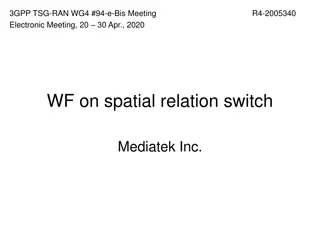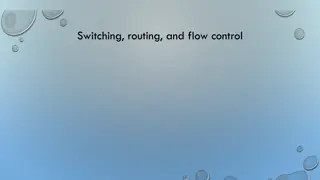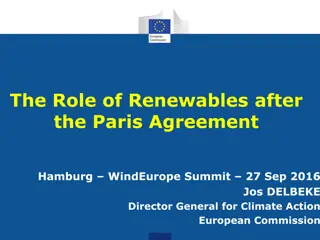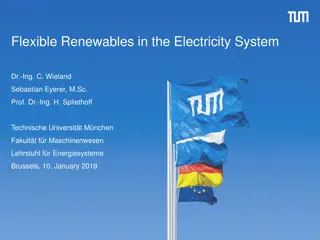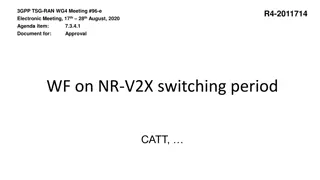The Urgency of Switching to Renewables
The world faces a critical juncture in addressing carbon emissions and combating climate change. The report from the Intergovernmental Panel on Climate Change highlights the pressing need for transitioning to renewable energy sources to mitigate global warming and environmental impacts. Understanding the implications of net zero emissions, the role of carbon capture technologies, and the imperative for immediate action is crucial in shaping a sustainable future for our planet.
Download Presentation

Please find below an Image/Link to download the presentation.
The content on the website is provided AS IS for your information and personal use only. It may not be sold, licensed, or shared on other websites without obtaining consent from the author.If you encounter any issues during the download, it is possible that the publisher has removed the file from their server.
You are allowed to download the files provided on this website for personal or commercial use, subject to the condition that they are used lawfully. All files are the property of their respective owners.
The content on the website is provided AS IS for your information and personal use only. It may not be sold, licensed, or shared on other websites without obtaining consent from the author.
E N D
Presentation Transcript
Who doesn't want us to switch to renewables?
Learning intentions: Students will... ... understand why there are advocates for many different approaches to our carbon emissions challenge. Success criteria: Students can ... explain the benefits and drawbacks of carbon capture and storage technologies ... explain the persuasive logic different parties use when advocating for or against carbon capture and storage technologies
The Intergovernmental Panel on Climate Change (IPCC) is the United Nations body for assessing the science related to climate change. It was created to provide policymakers (governments) with regular scientific updates about climate change; highlight the impact climate change will have on the planet in the future; and, offer some ideas about how to tackle the challenges of climate change's potential effects on the planet. In 2021-22, the IPCC released Part 1 of the Sixth Assessment Report. This is the most up-to-date physical understanding of the climate system and climate change.
The report makes a number of important points: It is unequivocal that human influence has warmed the atmosphere, ocean and land (A1). What does the word unequivocal mean? Global surface temperature will continue to increase until at least mid-century under all emissions scenarios considered. Global warming of 1.5 C and 2 C will be exceeded during the 21st century unless deep reductions in CO2 and other greenhouse gas emissions occur in the coming decades (B1). The report describes five possible climate futures, where #1 is not great and #5 is extremely bad. If we want to keep global warming at less than two degrees, which the IPCC says is the best-case scenario, we need to reduce our C02 and greenhouse gas emissions significantly and start right away.
'Net zero' or 'carbon neutral' are terms that refer to achieving an overall balance between greenhouse gas emissions produced and greenhouse gas emissions taken out of the atmosphere. Getting to net zero means we can still produce some emissions, so long as we're doing something else to reduce the greenhouse gases already in the atmosphere at the same time, kind of like balancing a set of scales (more info).
"With the ongoing climate emergency and nations commitments to meet net-zero goals by 2050, there s a heightened need to significantly reduce greenhouse gas emissions through whatever means possible." - Naoko Ellis
"Time matters in the race to decarbonization." - Naoko Ellis
"Just as we, as a society, have come to accept paying for the proper handling of our solid wastes, industry must accept paying for the proper handling of its carbon dioxide emissions." - Naoko Ellis
"With the ongoing climate emergency and nations commitments to meet net-zero goals by 2050, there s a heightened need to significantly reduce greenhouse gas emissions through whatever means possible." "Time matters in the race to decarbonization. "Just as we, as a society, have come to accept paying for the proper handling of our solid wastes, industry must accept paying for the proper handling of its carbon dioxide emissions.
Bill Gates-Backed Carbon Capture Plant Does The Work Of 40 Million Trees In Squamish, British Columbia, there s a company that wants to stop climate change by sucking carbon dioxide out of the atmosphere. It s called Carbon Engineering, and it uses a combination of giant fans and complex chemical processes to remove carbon dioxide from the air in a procedure known as Direct Air Capture. Direct Air Capture isn t new, but Carbon Engineering says its technology has advanced enough for it to finally make financial sense. The company is backed by Bill Gates but also by the oil giants Chevron, BHP, and Occidental. These partnerships will bring Carbon Engineering s tech to market by using the captured carbon to make synthetic fuels and and help extract more oil from the ground. Will Carbon Engineering s technology decrease the amount of CO2 in the air, or is it going to prolong our dependence on fossil fuels? Subscribe to CNBC: https://cnb.cx/SubscribeCNBC Subscribe to CNBC TV: https://cnb.cx/SubscribeCNBCtelevision Subscribe to CNBC Classic: https://cnb.cx/SubscribeCNBCclassic About CNBC: From 'Wall Street' to 'Main Street' to award winning original documentaries and Reality TV series, CNBC has you covered. Experience special sneak peeks of your favorite shows, exclusive video and more. Connect with CNBC News Online Get the latest news: https://www.cnbc.com/ Follow CNBC on LinkedIn: https://cnb.cx/LinkedInCNBC Follow CNBC News on Facebook: https://cnb.cx/LikeCNBC Follow CNBC News on Twitter: https://cnb.cx/FollowCNBC Follow CNBC News on Instagram: https://cnb.cx/InstagramCNBC #CNBC #ClimateChange How Carbon Capture Can Affect Climate Change
Carbon capture and storage use technologies to take the carbon dioxide released from combustion stacks and fossil fuel generating plants (and other places), convert it into a solid form, and store it away, usually underground. However, despite having been promised for decades, and having had billions of dollars in funding committed to it in Australia alone, CCS still only captures about 0.3% of the 34.6bn tonnes of annual global emissions released burning fossil fuels.




